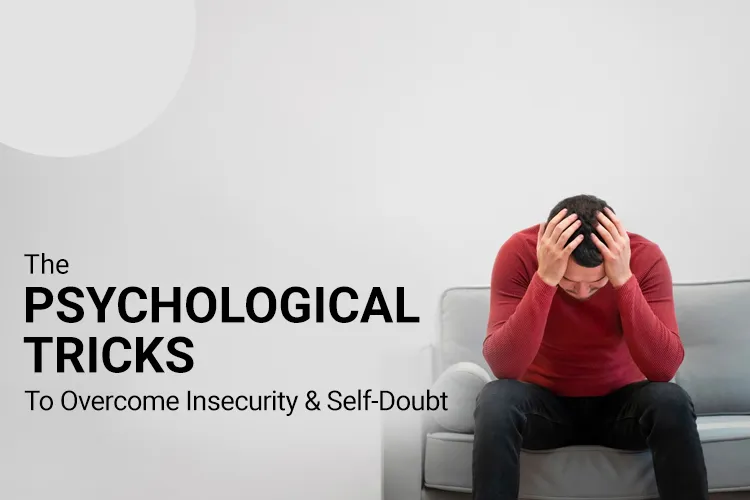Insecurity is a common issue that affects people of all ages and backgrounds. It can stem from a variety of reasons, such as childhood experiences, past traumas, and even societal pressures. However, it is important to remember that insecurity is not a permanent state, and there are psychological tricks that can help you overcome it.
Insecurities can hold us back in so many ways, preventing us from living our best lives and reaching our full potential. But with a little bit of self-reflection, self-care, and self-love, we can overcome our insecurities and start living with confidence and joy.
If you are struggling with feelings of inadequacy, self-doubt, or fear of judgment, you are not alone. As Taylor Swift sings in her hit song “Shake It Off” “haters gonna hate, hate, hate, but I’m just gonna shake it off.” And that’s exactly what we’re here to help you do.
In this article, we will discuss some of the most effective tricks to overcome insecurity. We will explore strategies for boosting your self-esteem, building resilience, and cultivating a positive self-image. So, join us as we shake off the negativity and embrace the power of self-love and self-acceptance.
Identify Your Triggers
The first step to overcoming insecurity is to identify the situations or events that trigger your insecurities. This can be anything from being around a particular person to speaking in public. Once you have identified your triggers, you can work on developing coping mechanisms to deal with them.
Practice Self-Compassion
Many people who struggle with insecurity are often their own harshest critics. They are quick to judge themselves and often hold themselves to impossibly high standards. Practicing self-
compassion involves being kind and understanding toward yourself. It means acknowledging your flaws and mistakes without beating yourself up about them.
Our mental wellness experts can equip you with quite a few skills to deal with day-to-day stressors.
Challenge Negative Thoughts About Yourself
Negative thoughts about your abilities can be a major contributor to insecurity. Challenging these thoughts involves questioning their validity and replacing them with more positive and realistic ones. For example, instead of thinking “I am not good enough,” you could think “I may not be perfect, but I am capable and worthy”.
Practice Self-Care
Taking care of yourself is an important aspect of building resilience. This might include getting enough sleep, eating a healthy diet, getting regular exercise, and engaging in activities that bring you joy and relaxation.
Learn from Challenges and Setbacks
Resilience is not just about bouncing back from difficult situations – it is also about learning and growing from them. Try to view challenges and setbacks as opportunities for growth and development, and reflect on what you can learn from these experiences. This can help you develop new skills and strategies for coping with adversity in the future.
Take Action
Building resilience requires taking action and making changes in your life. This might mean setting new goals, trying new things, or facing your fears. By taking action and pushing yourself out of your comfort zone, you can build confidence in your abilities and develop new coping skills.
Focus on Your Strengths
Insecurity often makes people focus on their weaknesses rather than their strengths. This can be counterproductive as it reinforces negative self-talk and can make people feel worse about themselves. Instead, it is important to focus on your strengths and celebrate your accomplishments. This can help boost your self-esteem and make you feel more confident in yourself.
Is any app can help you with your mental health? It’s absolutely Yes! Download Our App now.
Surround Yourself with Positive People
The people you surround yourself with can have a significant impact on your mental well-being. Surrounding yourself with positive, supportive people can help you feel more confident and secure. Conversely, being around negative or critical people can reinforce feelings of insecurity. It is important to choose your social circle carefully and spend time with people who make you feel good about yourself.
Practice Mindfulness
Mindfulness involves being present in the moment and focusing on the present rather than dwelling on the past or worrying about the future. Practicing mindfulness can help you become more aware of your thoughts and feelings and reduce the impact of negative self-talk. It can also help you
become more self-aware and improve your overall mental well-being.
Set Achievable Goals
Setting achievable goals can help boost your self-confidence and make you feel more capable. It is important to set goals that are realistic and attainable, rather than setting yourself up for failure by setting unrealistic expectations. Achieving small goals can help build momentum and make you feel more confident in your abilities.
In a nutshell, insecurity is a common issue that affects many people. However, it is important to remember that it is not a permanent state and can be overcome with the right psychological tricks. By identifying your triggers, practicing self-compassion, challenging negative self-talk, focusing on your strengths, surrounding yourself with positive people, practicing mindfulness, and setting achievable goals, you can overcome insecurity and improve your overall mental well-being.
What are your defense mechanisms? want to talk with some experts? Connect to the Best Online Therapist



